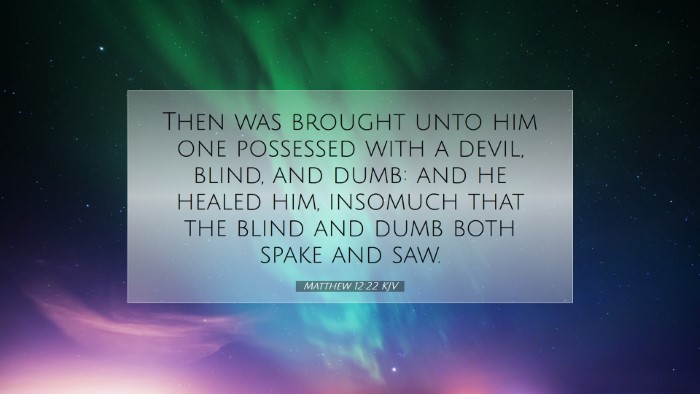Matthew 12:22 - Commentary Summary
Matthew 12:22 states:
“Then was brought unto him one possessed with a devil, blind, and dumb: and he healed him, insomuch that the blind and dumb spake, and saw.”
Introduction
This passage highlights a profound miracle performed by Jesus, illustrating His authority over both physical ailments and spiritual oppression. The healing of a possessed, blind, and mute individual serves not only as a demonstration of Jesus' divine compassion and power but also as a critical moment that reveals the growing tension between Him and the religious leaders of the time.
Context and Background
To fully understand this verse, one must consider the surrounding narrative and the cultural context. Jesus' ministry, defined by healing and teaching, consistently confronted the spiritual darkness prevalent in society. In this instance, we see the physical embodiment of that darkness in a man afflicted by demonic possession, unable to see or speak.
This miracle was not only significant for the individual but also for the crowd witnessing it. Such events were signs of the Messianic age, which the Jewish people had been anticipating. The response of the onlookers would directly connect to their understanding of Jesus' identity and authority.
Exegesis
Matthew Henry’s Commentary illuminates the text by emphasizing the spiritual and physical disabilities of the man. Henry points out that being "possessed with a devil" illustrates the severity of spiritual oppression. The dual condition of blindness and muteness serves as a metaphor for spiritual blindness and inability to confess Christ, often found among the Pharisees.
Albert Barnes further examines the miracle's implications, noting that healing the blind and mute not only restored the individual’s physical capacity to speak and see but was also a symbolic act of revealing truth to those unable to perceive it. Barnes highlights how this miracle exemplifies Christ as the fulfillment of prophesied Messianic signs.
Adam Clarke draws attention to the miraculous nature of the event, stressing that only the power of God could enable such a transformation. He notes the importance of acknowledging the spiritual reality of possession and its impact on a person's life and well-being, advocating for a holistic understanding of health that encompasses both spiritual and physical dimensions.
Theological Implications
The theological significance of this verse extends beyond mere healing. It invites readers to reflect on:
- The Authority of Jesus: This passage solidifies Christ’s authority over demonic powers, affirming His divinity and the establishment of the Kingdom of God on earth.
- Manifestation of Compassion: Jesus’ empathetic actions toward the afflicted illustrate the compassionate nature of God. His willingness to heal signifies a deeper desire to restore humanity from the grips of sin and suffering.
- Spiritual Blindness: The condition of the healed man invites a broader reflection on spiritual blindness prevalent in society. Just as physical healing occurs, so too does spiritual illumination when one encounters Christ.
Application for Believers
This verse has profound applicability for pastors, theologians, and students of the Bible. It serves as a reminder that:
- Your Ministry Reflects the Character of Christ: Like Jesus, believers are called to engage with those who are suffering and afflicted, providing both spiritual and physical assistance.
- Acknowledge Spiritual Reality: Understanding the spiritual dimensions of life is critical. Engaging with those wrought by spiritual oppression requires discernment and the power of the Holy Spirit.
- Respond to Jesus’ Authority: This passage challenges believers to consider their response to Jesus’ authority. Acceptance of Christ brings both healing and responsibility to share that healing with others.
Conclusion
Matthew 12:22 encapsulates a multifaceted understanding of Jesus’ ministry. The healing of the possessed man reveals not only His authority over demonic forces but also His compassionate heart towards humanity. As believers reflect on this passage, may it inspire them to engage actively in their communities, sharing the transformative power of Christ in both spiritual and physical realms.


